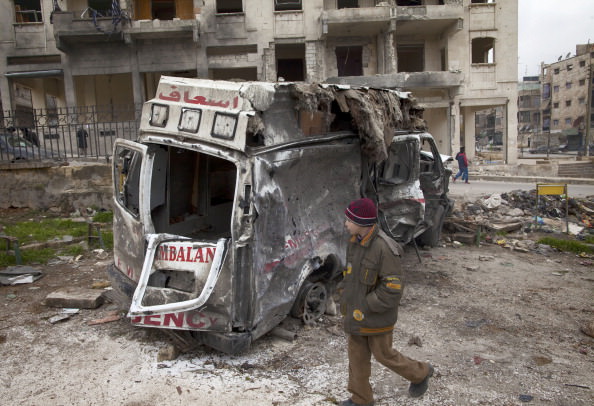JM Lopez/AFP/Getty Images
A destroyed ambulance in Aleppo, Syria, January 12, 2013
Article initially published in The New York Review of Books on November 3, 3013 and written by Annie Sparrow.
Bashar al-Assad’s counterinsurgency strategy appears to be deliberately targeting the civilian population and medical facilities in rebel areas, in order to deprive the armed opposition of its support.
Over the last few weeks, the growing plight of Syria’s civilian population has drawn belated international attention to the country’s failing health system. In late October, in the eastern part of the country, the World Health Organization confirmed an outbreak of polio—a highly infectious, fast-spreading disease that poses a potential threat not just to Syria but to the entire region. At the same time, reports of malnutrition and disease in the besieged areas on the outskirts of Damascus and other embattled cities, where there are severe shortages of food and milk, have raised new fears of a spreading public health disaster. But these developments are hardly new, nor are they, as the international press has suggested, simply the unfortunate byproducts of an increasingly brutal war. They are connected to something far more sinister: a direct assault on the medical system by the Syrian government as a strategy of war.
The Assad regime has come to view doctors as dangerous, their ability to heal rebel fighters and civilians in rebel-held areas a weapon against the government. Over the past two and a half years, doctors, nurses, dentists, and pharmacists who provide treatment to civilians in contested areas have been arrested and detained; paramedics have been tortured and used as human shields, ambulances have been targeted by snipers and missiles; medical facilities have been destroyed; the pharmaceutical industry devastated. Directly and indirectly, the attacks have had a profound effect on tens of thousands of health professionals and millions of Syrian patients, let alone the more than 2 million refugees who have fled to neighboring countries.
Here is how a surgeon from Aleppo describes the attitude of the Syrian government. Last April, while treating a man seriously wounded by a government sniper, he was accosted and wrenched away by a military intelligence officer: “We are shooting at them in order to kill them. This is obvious,” the intelligence officer told him. “Since you are stopping him from dying, you are a terrorist. For this you will be punished.” The surgeon’s clinic was destroyed, his wife’s clinic was shut down, and they were forced to flee Aleppo. As a surgeon, he is not authorized to practice in Turkey, where they have taken refuge, despite the urgent need of his skills there.
Read full article on nybooks.com


Recent Comments